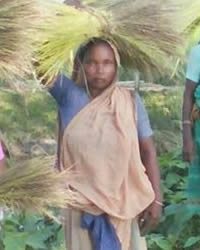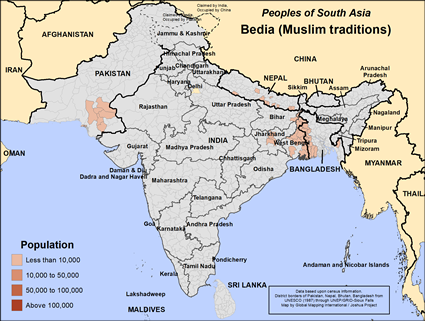Bedia (Muslim traditions) in Bangladesh

Photo Source:
Dipok Mahato - Wikimedia
Creative Commons
|

Map Source:
People Group data: Omid. Map geography: UNESCO / GMI. Map Design: Joshua Project
|
| People Name: | Bedia (Muslim traditions) |
| Country: | Bangladesh |
| 10/40 Window: | Yes |
| Population: | 53,000 |
| World Population: | 55,200 |
| Primary Language: | Bengali |
| Primary Religion: | Islam |
| Christian Adherents: | 0.00 % |
| Evangelicals: | 0.00 % |
| Scripture: | Complete Bible |
| Ministry Resources: | Yes |
| Jesus Film: | Yes |
| Audio Recordings: | Yes |
| People Cluster: | South Asia Tribal - other |
| Affinity Bloc: | South Asian Peoples |
| Progress Level: |
|
Introduction / History
The Bedias have an uncertain origin. They are known by other names in India such as 'wandering Kurmi ', Berai, Beria and Bedia Kudmi. The name Bedia is said to have come from the word behara meaning jungle. Older anthropological descriptions have equated the Bedia as a South Asia form of the European Romani. Most of the Bedias are Hindus, but there are many that are Muslims and very much unreached in Bangladesh, Nepal and India.
What Are Their Lives Like?
The traditional occupation of many Bedias has always been agriculture. In more recent years in north India and Nepal they have taken up wage labor jobs, rickshaw-pulling ,and some clans have been involved in the oldest of occupations, as well as women dancers (mujra) and singers.
The Bedias are not vegetarian and generally prefer to eat rice, maize, mandua and gondli. Because many live in rural communities, education is not a priority and consequently literacy is low.
What Are Their Beliefs?
The people are Sunni Muslims who believe that the supreme God, Allah, spoke through his prophet, Mohammed, and taught mankind how to live a righteous life through the Koran and the Hadith. To live a righteous life, you must utter the Shahada (a statement of faith), pray five times a day facing Mecca, fast from sunup to sundown during the month of Ramadan, give alms to the poor, and make a pilgrimage to Mecca if you have the means. Muslims are prohibited from drinking alcohol, eating pork, gambling, stealing, slandering and making idols. They gather for corporate prayer on Friday afternoons at a mosque, their place of worship.
The two main holidays for Sunni Muslims are Eid al Fitr, the breaking of the monthly fast and Eid al Adha, the celebration of Abraham s willingness to sacrifice his son to Allah.
Sunni religious practices are staid and simple. They believe that Allah has pre-determined our fates; they minimize free will.
In most of the Muslim world, people depend on the spirit world for their daily needs since they regard Allah as too distant. Allah may determine their eternal salvation, but the spirits determine how well we live in our daily lives. For that reason, they must appease the spirits. They often use charms and amulets to help them with spiritual forces.
What Are Their Needs?
There has been a reported response to the gospel among the Hindu Bedias in Bangladesh but among the Muslim Bedis there is no known believers. Muslims still wait for the life-giving gospel.
Prayer Points
Pray for spiritual hunger and a willingness to be persecuted for the sake of the gospel.
Pray for the Lord to thrust out workers to the Bedia people in Bangladesh.
Pray for Bedia disciples to make more disciples for God s glory.